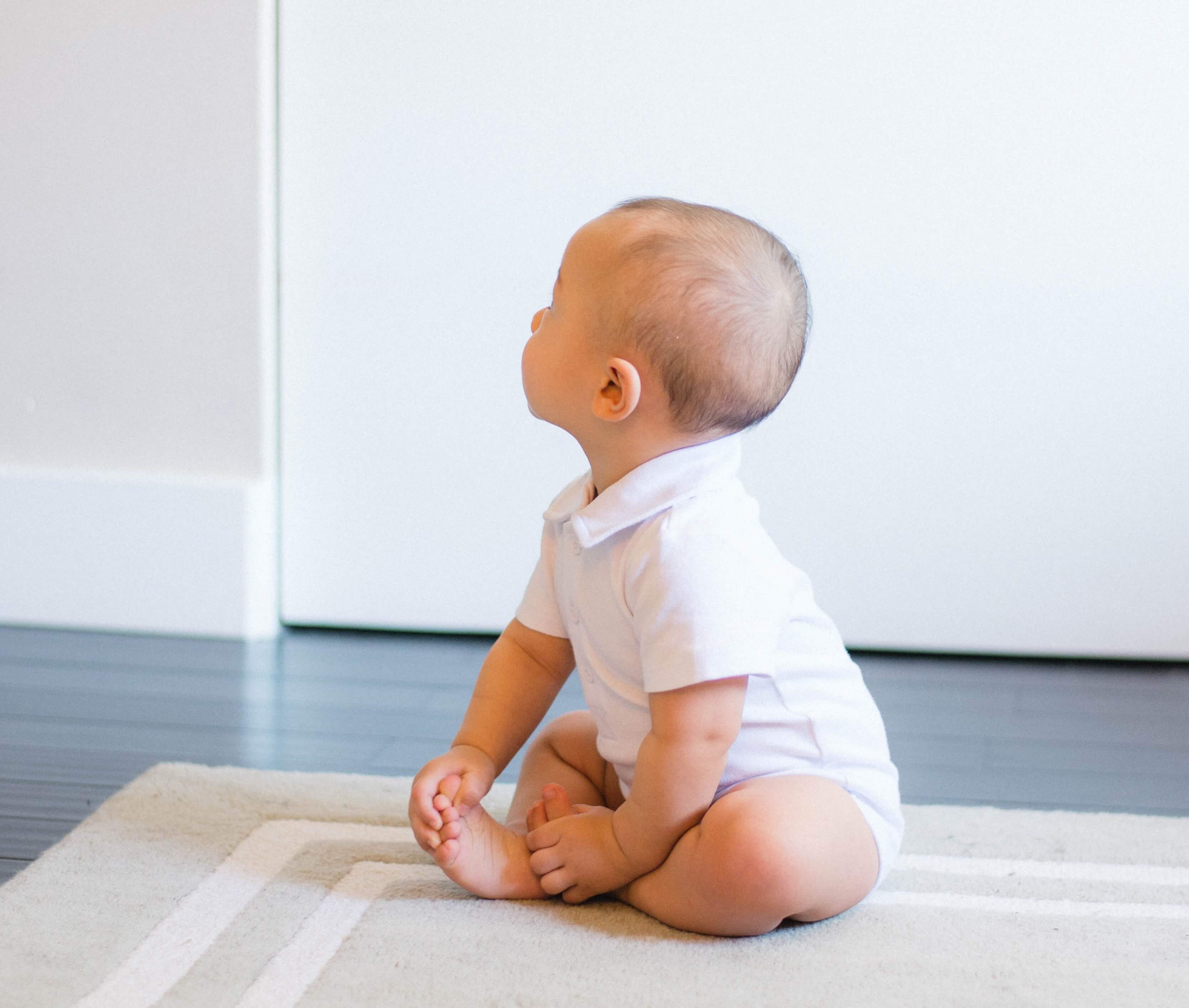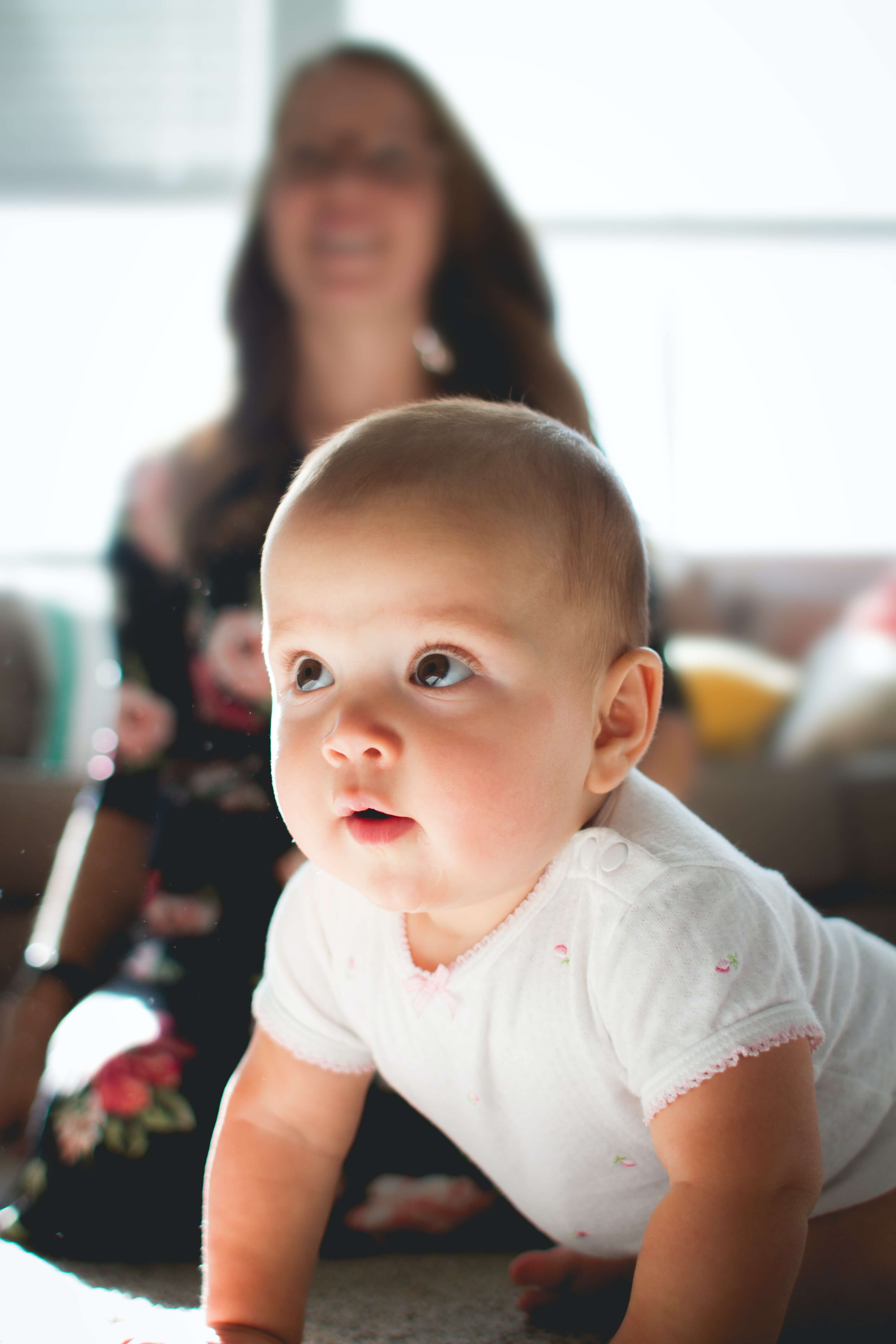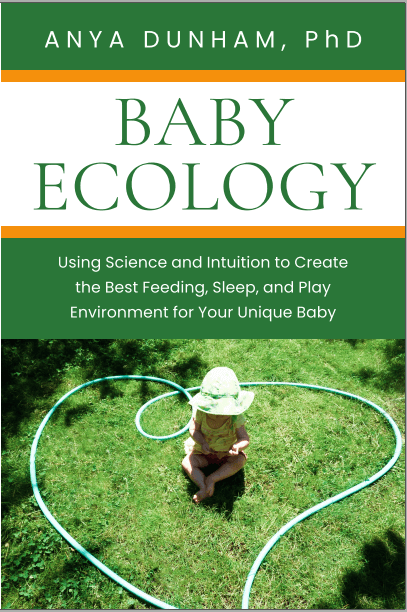Baby Ecology book is here! Learn more
Baby Ecology book is here!
- Home
- Baby activities
- Screen time for baby
- Background TV
Is background TV okay for baby?
by Anya Dunham, PhD
Health guidelines recommend no TV for baby. But what about background TV, when the screen is on, but your baby is not actively watching it?

I am sure you know that major health guidelines recommend no screen time during baby’s first year and beyond. But what about “background” television: when the screen is on but your baby isn't necessarily watching it?
The American Academy of Pediatrics (AAP) recommended no television viewing for children younger than 2 years old in 1999. This recommendation was reiterated and extended to mobile technology in 2011. In 2016, the AAP issued an update recommending no screen time except for video-chatting for children under 18 months, and carefully chosen high-quality programming, watched with a parent, beyond 18 months. In 2019 the World Health Organization recommended no screen time for children under 2 years old.
Why background TV is not great for your baby
In approximately 40% of families in the United States TV is on all day, whether someone is watching or not.1,2
Studies say that background TV still affects babies, even though they’re not actively watching:
- It distracts babies from interacting with their parents
- They tend to play less
- Their attention becomes less focused3,4
This is likely because even in the background, TV triggers babies’ orienting response: a reflex that fixes their attention on new sights and sounds.3 In and out of itself, this response is good and necessary: it’s one of the cornerstones of learning. But when it comes to TV, baby’s brain tries to figure out what’s happening (“Is this threatening? Is this important?”), but doesn’t get the chance to process any input. And all the sensory input becomes a distraction, or perhaps even a source of stress.
In my award-winning book, Baby Ecology, you'll find a comprehensive chapter on babies and screens, along with many ideas for creating the best conditions for your baby's learning and development.

As babies grow, their attention gradually develops from orienting response toward executive attention: they begin selecting specific information from sensory input.5 We usually call this focused attention, or focus.
Providing opportunities for uninterrupted free play is one of the best ways to help your baby develop focused attention. Being in a screen-free environment gives babies more opportunities for connecting, building strength, exploring, and learning.
Background TV and speech
Background TV might also make it more challenging for babies to learn words. Five-month-olds are beginning to extract individual words from speech, usually starting with their own name.6,7 Although they can hear almost as well as adults at this point, they are disadvantaged when there is background noise:8 because their ears and brains treat all sound input the same way, they find it harder to separate out individual words when speech is masked by other sounds. Generally, background noise louder than 50 dB (~ a quiet murmur of background TV) reduces baby’s ability to hear differences in pitch, intensity, and sound patterns.9
How much background TV is too much?
Is a couple of hours of background TV a lot for a baby? It could be. Most babies sleep 13-16 hours per day10 and spend another 3 or so hours feeding and being changed and dressed. A couple of hours of background TV could actually add up to a quarter - or even half - of their awake time.
Ideas for creating a screen-free environment
As you prepare for your baby's arrival or think about your baby's environment - perhaps even more so during the holiday season - consider these ideas for creating a screen-free environment for him or her:
- Save your screen time for when your baby is sleeping. This advice may seem obvious, but it’s surprisingly easy to get into the habit of using television, a tablet, or a phone during the long feedings in the early weeks and months. Try to avoid screens when you feed your baby, including at nighttime when stimulation and blue light can interfere with sleep.
- Limiting screen time can be challenging if you or your family members are used to having TV on in the background. If you want to turn television off but find alternative ways to “occupy the house” during the transition, try playing soft music or listening to podcasts some of the time.
- When you're visiting others, you have less influence on whether TV is on or not. Let your baby be your guide: if they become overstimulated, consider taking them into a quieter space or outside for a while.
BOTTOM LINE
- Background TV can negatively impact babies by distracting them from interactions and hindering focused attention development.
- Background TV may also impede babies' ability to learn words due to difficulties in separating speech from background noise.
- To create a screen-free environment, reserve screen usage for when the baby is sleeping, consider using soft music or podcasts as alternatives to 'occupy the house' some of the time, and be mindful of your baby's response to overstimulation in environments where TV is present.
I explore these and other ideas to help babies connect and learn in my award-winning book, Baby Ecology.
References
References
1. Rideout VJ, Vandewater EA, Wartella EA (2003) Zero to six: Electronic media in the lives of infants, toddlers and preschoolers. The Henry J. Kaiser Family Foundation report: https://www.kff.org/wp-content/uploads/2013/01/zero-to-six-electronic-media-in-the-lives-of-infants-toddlers-and-preschoolers-pdf.pdf
2. Hanson K (2017) The influence of early media exposure on children’s development and learning. Doctoral Dissertation. University of Massachusetts Amherst, MA, USA
3. Anderson DR, Pempek TA (2005) Television and very young children. American Behavioral Scientist 48(5): 505-522
4. Schmidt ME et al (2008) The effects of background television on the toy play behavior of very young children. Child development 79(4): 1137-1151
5. Posner MI, Rothbart MK, Voelker P (2016) Developing brain networks of attention. Current Opinion in Pediatrics 28(6): 720-724
6. Mandel DR, Jusczyk PW, Pisoni DB (1995) Infants' recognition of the sound patterns of their own names. Psychological Science 6(5): 314-317
7. Lloyd-Fox S et al (2015) Are you talking to me? Neural activations in 6-month-old infants in response to being addressed during natural interactions. Cortex 70: 35-48
8. Erickson LC, Newman RS (2017) Influences of background noise on infants and children. Current Directions in Psychological Science 26(5): 451-457
9. Marshall J (2011) Infant neurosensory development: considerations for infant child care. Early Childhood Education Journal 39(3): 175-181
10. Iglowstein I et al (2003) Sleep duration from infancy to adolescence: reference values and generational trends. Pediatrics 111(2): 302-307
Using hundreds of scientific studies, Baby Ecology connects the dots to help you create the best environment for sleep, feeding, care, and play for your baby.
Warmly,
Anya



